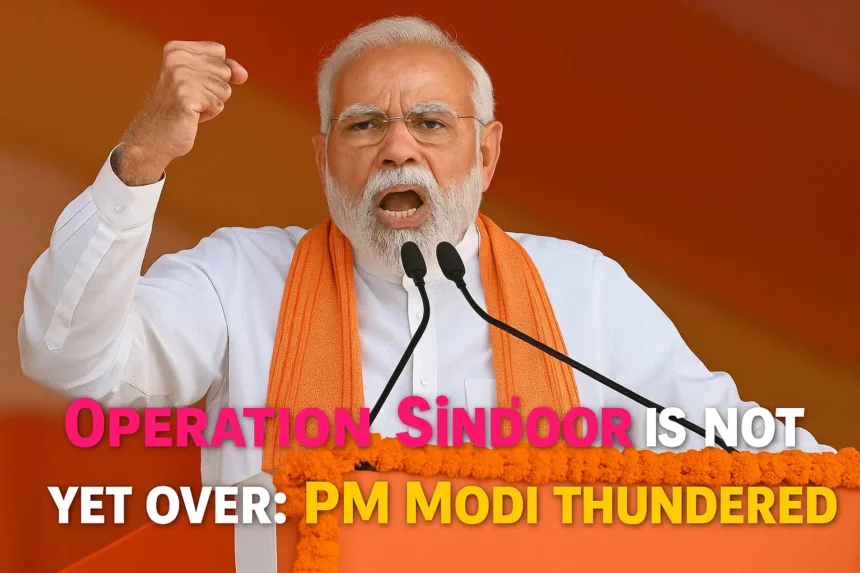PM Modi’s Bold Warning to Pakistan: A Message the World Can’t Ignore
In a powerful speech from Bengal, PM Modi declared that India has struck Pakistan “three times,” reaffirming the country’s zero-tolerance stance on terrorism. His message through Operation Sindoor isn’t just for Pakistan—it’s a global signal that India will respond decisively to any threat.
India’s Unfinished Battle: PM Modi Declares Operation Sindoor ‘Far From Over’
In a fiery address from the heart of West Bengal, Prime Minister Narendra Modi sent a chilling warning to Pakistan, declaring that India has “entered your house and killed you thrice.” This bold remark, made during a rally in Alipurduar, has ignited a wave of nationalism across the country.
His reference? Operation Sindoor—India’s latest and assertive military action launched on May 7—targeting terror infrastructure across the border in Pakistan and Pakistan-occupied-Kashmir (PoK).
Let’s dive deep into what Operation Sindoor means, why PM Modi is invoking past strikes, and what this declaration really signifies for India’s anti-terrorism resolve.
What is Operation Sindoor? The Meaning Behind the Name
Operation Sindoor isn’t just a military operation—it’s a symbol of India’s cultural pride and emotional resilience.
The word sindoor, or vermillion, carries deep emotional significance in Indian culture, especially in Bengal. During Durga Puja, the ritual of Sindoor Khela represents power, femininity, and celebration.
By naming the mission Operation Sindoor, India is making it clear: terrorists who dare to wipe the sindoor from the foreheads of our sisters will face unimaginable retaliation.
From the sacred land of ‘Sindoor Khela,’ I declare on behalf of 140 crore Indians—Operation Sindoor is not yet over, PM Modi thundered, drawing thunderous applause.
Operation Sindoor: The Unfolding Military Action
Launched on May 7, the operation saw Indian forces execute precision strikes on nine terror hubs inside Pakistan and PoK. These were strategic targets, believed to be key in facilitating cross-border terrorism.
India’s forces acted swiftly, systematically eliminating infrastructure that had long fueled violence in Kashmir. The goal? To destroy the roots of terror and send a clear message: India will not tolerate attacks on its soil.
Three Times We Struck: Modi’s “We Killed You Thrice” Statement Explained
One of the most gripping parts of PM Modi’s speech was this loaded sentence:
Pakistan should understand that we have entered your house and killed you three times.
Though PM Modi didn’t elaborate, experts believe this is a reference to:
- 2016 Surgical Strikes – Following the Uri terror attack, Indian commandos crossed the LoC and destroyed terrorist camps.
- 2019 Balakot Air Strikes – After the Pulwama suicide bombing, the Indian Air Force struck a Jaish-e-Mohammed camp in Balakot.
- 2025 Operation Sindoor – The most recent and still-active mission launched after the Pahalgam terror attack, targeting multiple camps deep in enemy territory.
Each strike is a chapter in India’s evolving military doctrine: swift, decisive, and unforgiving.
A New Doctrine: India’s Zero Tolerance Towards Terrorism
PM Modi’s rally was more than a campaign stop—it was a declaration of India’s zero-tolerance policy towards terrorism.
He made it clear: Every drop of Indian blood will be avenged.
After the Pahalgam attack, India has told the world—attack us, and you’ll pay the price.
This sentiment has found resonance among Indians worldwide who demand action, not appeasement, in the face of terror threats.
Bengal’s Symbolic Role: Why Alipurduar Was Chosen
The location of this speech wasn’t accidental. Bengal, with its strong traditions, warrior history, and cultural pride, serves as an emotional amplifier.
By invoking Sindoor Khela and choosing Bengal’s soil to issue a warning, PM Modi tapped into a deep emotional current, blending culture, military might, and nationalism into one powerful message.
Operation Sindoor and Global Messaging
This isn’t just a message to Pakistan. It’s a strategic international signal:
- To global terror networks: India will not hesitate to take action across borders.
- To world powers: India is asserting its sovereignty and strategic depth.
- To Indian citizens: You are protected; your army stands vigilant.
Operation Sindoor is India’s way of saying, “We will not wait to be victims.”
The Road Ahead: What’s Next for Operation Sindoor?
PM Modi made it crystal clear: “Operation Sindoor is not yet over.”
What does that mean?
- More intelligence-based strikes could be in the pipeline.
- India may continue leveraging military, cyber, and economic tools to cripple terror operations.
- PoK could remain under India’s watchful eyes for future operations.
India’s policy has shifted from defensive to proactive counterterrorism, and Operation Sindoor is just the beginning.
Final Thoughts: A Nation’s Roar, A Terrorist’s Nightmare
India’s message is clear and unmissable:
- We will not forget. We will not forgive. We will not stop.
- As Operation Sindoor continues, so does the unwavering resolve of a billion people standing behind their armed forces.
- From Uri to Pulwama to Pahalgam—each attack has been a wake-up call. But today, India is wide awake and ready to strike back.
Stay Updated, Stay Patriotic
Want to know more about India’s military operations and defense strategies?
Click here to read more on Operation Sindoor and India’s evolving military doctrine.
Follow us for real-time updates on geopolitical developments, Indian defense, and national security.
Subscribe now and never miss a moment that defines India’s future.
Most read: https://tnheadlines24.com/revelations-by-shahbaz-on-india-strike/
Also read: https://tnheadlines24.com/pakistan-is-desperate-after-indias-water-move/
Disclaimer: The views and statements mentioned in this article are based on public addresses, media reports, and general information available in the public domain. TN HEADLINES24 is not responsible for the accuracy, completeness, or reliability of the content. Readers are advised to verify facts independently before forming any opinion or conclusion.








